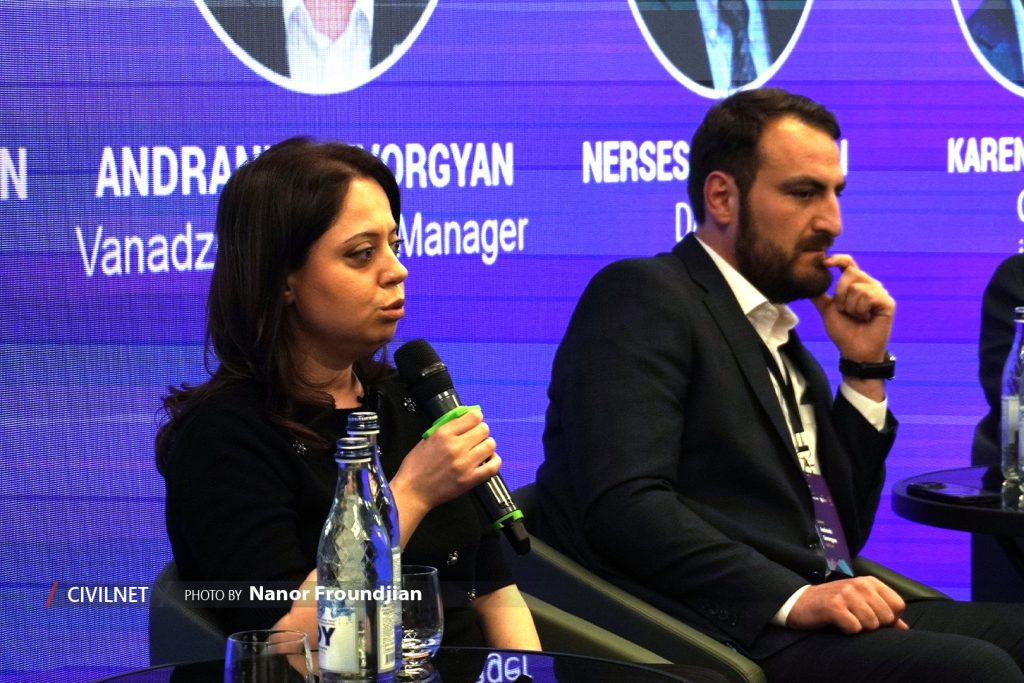By Nanor Froundjian
With the rapid growth in tech and AI industries continuously shifting global dynamics, experts and entrepreneurs discuss Armenia’s developing footing in the sector while broaching top priorities for the country to keep up with new advancements, as well as its shortcomings.
The 2025 Silicon Mountains Lori Forum & Expo, held on May 15, was divided into three panels – AI & Automation, Cybersecurity & Data Protection, and Intelligent Digital Infrastructures – on top of featuring keynote speaker Dr. Yoshiaki Damon Hagiwara, a pioneering engineer and scientist.
Held at the Children of Armenia Fund (COAF) Concept Hotel, the event was organized by the Union of Employers of Information and Communication Technologies (UEICT), in partnership with COAF, UNICOMP, Ucom, Acba Bank, the Ministry of High-Tech Industry of the Republic of Armenia, the British Embassy in Yerevan, and Viasphere Technopark.

Speakers across all panels overlapped in their positioning about strengthening and expanding AI education, particularly among youth specifically in Armenia’s regions and communities.
“We need to catch up with new tendencies, new approaches. We are trying to incorporate and integrate (AI education) as much as possible, but it’s challenging for every organization,” said COAF executive director Liana Ghaltaghchyan, who spoke on the Intelligent Digital Infrastructures panel.
Schools in Armenia, she said, are not delivering education up to par with the rapidly evolving AI and technology fields, which is why learning hubs like the COAF SMART Center are an asset to the youth, especially those in the country’s rural areas.
Around 1,700 students across nearly 30 communities walk through the doors of the COAF SMART Center in Debed each week to learn from the range of programs.
Ghaltaghchyan added that a focal point now for her team is looking into the logistics of AI and analyzing how and what they should adopt to improve the center.
Aside from expanding the programs, plans are in place to open COAF SMART centers in Goris, Armavir, and Kapan over the next three years.
These educational hubs will also bridge the gap between Yerevan and Armenia’s villages, where Ghaltaghchyan noted that access to education and quality services remains a challenge.
“The main thing is the development of human capital, so that they are equipped, they are educated, and they see the future in their communities,” she said.
Svetlana Jaghatspanyan, Vanadzor branch manager at Hi-Tech Gateway who spoke on the AI & Automation panel, also pointed out the quick development of Viasphere Technopark in Lori, where her company is located.
About 300 teachers are already receiving AI training there, she said, with an estimated 400 more incoming.
By bringing advanced education to the regions, these initiatives aim to encourage the youth to stay within their communities.
From the Intelligent Digital Infrastructures panel, Andranik Gevorgyan, regional manager of UEICT Vanadzor, also noted challenges in keeping youth in their communities. Often, he said, they choose to study in Yerevan and don’t return to the regions.
“There is a lot of potential for human capital in regions, even in remote villages,” he said.
Though many doubted information and communication technologies-related initiatives would succeed in the regions, Gevorgyan said he’s seen many successes including in Vanadzor, Stepanavan, Dsegh, and Debet.
“Experience shows that we are able to succeed in the regions thanks to our diligence. We have to keep working hard, and we have to learn how to learn,” he said.
Ghaltaghchyan echoed the sentiment, maintaining that students wouldn’t be able to fully benefit from the tools at their disposal without first having the know-how to understand and use them.

“The problem is the digital literacy itself,” said Ghaltaghchyan. “This is a real challenge.”
Across the other panels, speakers pointed towards a need for education and awareness in their respective AI-related fields to increase resilience and literacy: that’s what the majority of speakers on the Cybersecurity & Data Protection panel listed as the top priority for Armenia within the next two years.
“Empowering the young generation is the key,” said Komitas Stepanyan, Director of the IT and Cybersecurity Department of the Central Bank of Armenia. Inspiration, he said, is a essential component of efforts to move ahead.
The conversation among many of the panelists also highlighted an agreement to encourage collaboration between the public and private sectors.
“I think that we all represent the country and we’re all aiming to work towards the improvement and development of state functions,” Ghaltaghchyan added, emboldening the notion that nation and people need not be seen as two entirely separate entities, but rather as one that is already united through a shared goal.
The post How AI education could propel Armenia forward appeared first on CIVILNET.